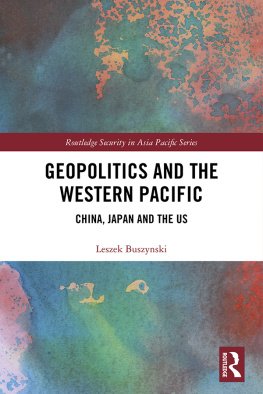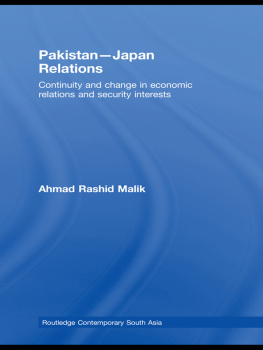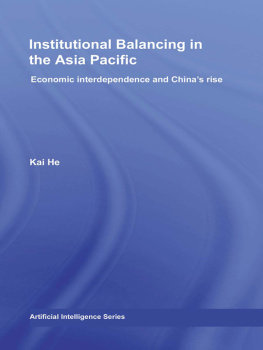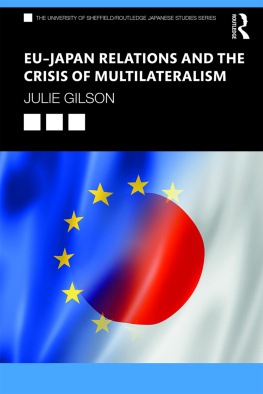Destinies Shared
U.S.-Japanese Relations
Destinies Shared
U.S.-Japanese Relations
Edited By
Paul Gordon Lauren and Raymond F. Wylie
Introduction by Ambassador Mike Mansfield
First published 1989 by Westview Press, Inc.
Published 2018 by Routledge
52 Vanderbilt Avenue, New York, NY 10017
2 Park Square, Milton Park, Abingdon, Oxon OX14 4RN
Routledge is an imprint of the Taylor & Francis Group, an informa business
Copyright 1989 Taylor & Francis
All rights reserved. No part of this book may be reprinted or reproduced or utilised in any form or by any electronic, mechanical, or other means, now known or hereafter invented, including photocopying and recording, or in any information storage or retrieval system, without permission in writing from the publishers.
Notice:
Product or corporate names may be trademarks or registered trademarks, and are used only for identification and explanation without intent to infringe.
Library of Congress Cataloging-in-Publication Data
Destinies shared: U.S.-Japanese relations / edited by Paul Gordon Lauren and Raymond F. Wylie; introduction by Mike Mansfield.
p. cm.(Westview special studies on East Asia)
Bibliography: p.
Includes index.
ISBN 0-8133-0631-0
1. United StatesRelationsJapan. 2. JapanRelationsUnited States. I. Lauren, Paul Gordon. II. Wylie, Raymond Finlay, 1941-III. Series.
E183.8.J3D47 1989
303.4'8273'052dc19
89-31145
CIP
ISBN 13: 978-0-367-00562-7 (hbk)
For
Ivan and Mary Lou Lauren
and
Sheelagh and Teresa Wylie
Contents
, Mike Mansfield
, Raymond F. Wylie and Paul Gordon Lauren
, Robert C. Christopher
, Michael H. Armacost
, Raymond F. Wylie
, Saburo Okita
, Akio Morita
, Dennis J. O'Donnell
, Tommy T.B. Koh
, William K. Cummings
, Leonard H. Lynn
, Ronald A. Morse
Guide
It gives us great pleasure to acknowledge the many individuals who have contributed in one way or another to this book. In addition to the Mansfield Center and the contributors themselves, we extend gratitude to
members of our advisory committeeRoy Anderson, Albert Borgmann, Thomas Huff, James Flightner, James Lopach, Leo Moser, John O. Mudd, Dennis O'Donnell, Howard Rheinhardt, Daniel Smith, and Philip Westfor conceptual design and organizational help
members of our foundation's board of directorsMax Baucus, Christopher Dodd, Tom Foley, Richard Gerstner, Gerald Grinstein, James Hodge, James D. Hodgson, Henry Kissinger, James V. Koch, Daniel Lambros, Brian Powers, Kenneth B. Pyle, Paul Schmechel, Ted Schwinden, Lloyd Schermer, Bruce Sievers, Lester Thurow, Paul Volcker, and Charles Youngfor direction and assistance
the Burlington Northern Foundation for financial support
Bill Brown, Virginia Braun, Mary Ann Campbell, Susan Carlson, Jeff Demestrescu, Bev Decker, Donald Habbe, Claudia Johnson, Tovah LaDier, Al Madison, Ron Klaphake, Jim Raphael, Kate Saenger, Howard Skaggs, Brian Spellman, and Stephen Wing for various forms of assistance
Irene Finley for outstanding staff support
Libby Barstow, Barbara Ellington, Miriam Gilbert, Bruce Kellison, Kathy Streckfus, and Brenda Satrum of Westview Press for publication advice and help
our wives, Susan and Sue, for their patience and encouragement.
Paul Gordon Lauren
Raymond F. Wylie
Reflections on the United States and Japan
Mike Mansfield
As we approach what is often called the Age of the Pacific one fact is clearly before us: The next century will see the United States and Japan standing together at the dynamic center of a new global economic structure. Together, along with the other advanced nations, we will shareeven more than we do todaythe awesome responsibility for the economic future of the entire world.
Bearing the responsibility for shaping much of the world's economic structure is not new to the United States; it is what the Marshall Plan and much post-World War II U.S. history is all about. But sharing this responsibility is new, and here we have the challenge. We must learn to see things in new ways, to understand the nature of our interdependence with Japan, and to reconceive our national interest in light of what we understand of this relationship.
In this Introduction, I wish to reflect upon some themes that have interested me in my work over the years in Tokyo and to sum up my thinking about this valuable partnership we have with the Japanese. I hope that from this endeavor, a picture will emerge outlining the ties between our two nations and delineating where I think we ought to go and some ways that we need to prepare, on both sides, to get there.
The Beginnings
As I look out my window over the Tokyo skyline, I marvel at what has been accomplished here since the devastation of the war. This economic miracle that surrounds me here in Tokyo is the result of a people who savedeven when they had very little to savewho put off recreation and personal pleasures for the sake of rebuilding, who worked with an astounding efficiency and determination in a manner not seen in the United States since the darkest days of World War II.
These patterns of domestic independence, frugality, and diligence applied so successfully in japan during the postwar period, with the support and encouragement of the United States, have served the Japanese well. But it became clear in the 1970's that these patterns, coupled with a uniquely aggressive export orientation, were creating more and more difficulties for the United States. The U.S. economy simply was not prepared for interaction with an emerging economic superpower that maintained the ethics and economic practices of a less developed nation. In tracing the history of the U.S.-Japanese relationship, we can see the development of two paradoxical economic themes: growing international interdependence and increasing economic frictions.
In the early years of this relationship we were fortunate indeed to be led by men of vision: Prime Minister Shigeru Yoshida, and Secretaries of State George Marshall and John Foster Dulles. But I believe even these men of great foresight could not have predicted how deep and far-ranging our relationship would develop.
To be sure, we started with a good framework. The Treaty of Mutual Security and Cooperation, signed in 1951, gave us the promise of a strong and peaceful Asia with an independent Japan free to pursue its political and economic destiny. In those early years of working together, we learned much about each other. Americans learned that the Japanese have an enormous capacity for resilience, for hard work, and for succeeding in the face of adversity. I believe that during this period, many Japanese learned that Americans have virtues that they also respect, plus an optimism about the future and a willingness to roll up their sleeves and share the work.
Over time, despite our vastly different languages and cultures, despite our geographical distance and divergent histories, and despite the war, we became friends. There just seemed to be something about the Japanese and American characters that made our peoples come to like and respect each other.








